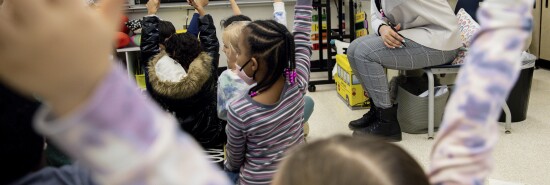
Maryland public schools’ religious showdown highlights need for more choice
Neal McCluskey
Video Embed
Like most states, Maryland is seeing clashes in public schools between people with differing worldviews. Things are especially hot in Montgomery County, where parents from various religious backgrounds are fighting children’s forced exposure to readings they believe advance pro-LGBT ideology.
Unlike many states, Maryland has not done the right thing for a free, diverse society: expanding educational freedom. Indeed, it has gone backward.
JIM BANKS DECLARES WAR ON EGG TYCOON SCRAMBLING INDIANA SENATE RACE
The battle in Montgomery County pits religious beliefs about the nature of humanity and sexuality against desires for curricula that include all families. It also pits those who believe that no discussion of sexuality is appropriate for young children against those who believe that children must learn early on to accept all kinds of people.
The clash has generated protests and a lawsuit from families contending that prohibiting opt-outs from readings violates their religious rights. The suit suffered a setback last week when a federal court denied the plaintiffs’ request for an injunction against the no opt-out policy. The plaintiffs intend to appeal.
An opt-out seems like an obvious way to deal with sincerely held religious beliefs butting heads with desires to incorporate all people in the curriculum. But that has been rejected by the district for two reasons, one not necessarily in contradiction to a free society, the other decidedly so.
The first reason is basically logistical: It would be very hard to run schools if everyone could opt out of whatever they find objectionable.
As reported in the court’s ruling, “The School Board determined that principals and teachers ‘could not accommodate the growing number of opt-out requests without causing significant disruptions to the classroom environment and undermining MCPS’s educational mission.’”
In other words, teachers’ burdens would be multiplied if families kept objecting to class material and teachers had to find alternative readings or assignments constantly.
The other major objection is ideological: In the name of tolerance, families must have their children exposed to material they find unacceptable.
As board member Lynne Harris argued at a board meeting, “Saying that a kindergartener can’t be present when you read a book about a rainbow unicorn because it offends your religious rights or your family values or your core beliefs is just telling that kid, ‘Here’s another reason to hate another person.’ And we are not going to do that in the school system.”
Criticizing religious viewpoints as hateful, while maybe intolerant, is consistent with a free society. But opt-out opponents are not just criticizing. They are imposing their views.
Maybe aggrieved families should just choose private or homeschooling.
That, according to the court’s ruling, is what Harris suggested: “If they want their child to receive an education that strictly adheres to their religious dogma, they can send their kid to a private religious school.”
Choosing is, of course, consistent with freedom. But in this case, it misses a huge factor: Parents must pay taxes for public schools. If they want something consistent with their religious convictions, they have to pay twice.
The solution to this problem is clear, especially given the logistical barriers to opt-outs: Let education funding follow students to options their families choose.
School choice has exploded over the last few years, with numerous states expanding existing programs or creating new ones, including a huge swing toward universality — choice without eligibility limits. Since Arizona enacted a universal education savings account program in mid-2022, six other states have enacted universal programs, typically ESAs. Those give families money they can spend not just on private school tuition but on options ranging from tutoring to curricular material.
CLICK HERE TO READ MORE FROM THE WASHINGTON EXAMINER
Unfortunately, just as many other states were moving forward, Maryland was moving backward, cutting its already tiny BOOST scholarship program from $10 million to $9 million. Some saw that as a victory because it avoided a $2 million cut Gov. Wes Moore (D-MD) wanted. But given the need for an education system that truly embraces pluralism and increasing demand for choice, the program needs to be much bigger, not shaved down.
For equality and peace, the government must not take sides among deeply held values. In education, that demands school choice.
Neal McCluskey directs the Cato Institute’s Center for Educational Freedom and is the author of The Fractured Schoolhouse: Reexamining Education for a Free, Equal, and Harmonious Society.
